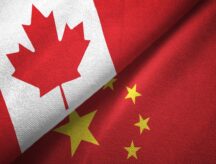Canada clarifies who is affected by coronavirus travel ban
Canada has issued a new official statement to define the terms of the travel ban first announced on Monday, March 16 to help limit the spread of the coronavirus (COVID-19).
The ban, which started on March 18 at 12 p.m. EDT, is in effect until June 30, 2020 at 12 p.m. EDT, according to the government statement.
Initially, officials said the ban applied to all foreign nationals, but excluded Canadian citizens and permanent residents, immediate family members of Canadian citizens, as well as aircrews, diplomats, and U.S. citizens. The exception for U.S. citizens was amended on Wednesday to stop non-essential travel across the border.
However, the new statement issued by the Canadian government today confirms that immediate family members of permanent residents are also excluded from the ban, meaning they are still able to travel to Canada.
Find out if you are eligible for any Canadian immigration programs
Who is allowed to come to Canada
Besides Canadians, permanent residents and their families, Canada will allow certain people to be exempt from the travel ban.
The government’s website outlines 16 scenarios that would allow a person to enter Canada, including the following exemptions which pertain to permanent and temporary residents:
- immediate family members of Canadian citizens or permanent residents, immediate family members include spouses, common-law partners, dependent children of either the resident or their partner, and grandchildren of citizens and permanent residents;
- people who have been authorized, in writing, by a consular officer of the Government of Canada to enter the country for the purpose of reuniting immediate family members;
- people who have only been in Canada or the U.S. during the 14 day period before arriving in Canada;
- people who are considered “protected persons” where their refugee protection has been conferred and they have not had their claims or applications subsequently deemed to be rejected;
- people who will provide an “essential service” while in Canada; and
- people whose presence in Canada is in the national interest according to the opinion of the Minister of Foreign Affairs, the Minister of Citizenship and Immigration or the Minister of Public Safety and Emergency Preparedness.
Ongoing uncertainty regarding study and work permit holders
There is conflicting information on the status of valid study and work permit holders who are currently outside of Canada and the U.S.
Public remarks made by Canada’s Public Safety Minister Bill Blair on Wednesday, March 18 were cited as evidence that such individuals would be eligible to return to Canada.
However, recent federal government statements obtained by CIC News via email provide more nuance.
A federal government statement on March 19 reads:
Air Carriers
To confirm, a travel ban has been implemented through an order under the Aeronautics Act which requires air carriers operating flights to Canada to deny boarding to any passenger who is not a Canadian citizen or permanent resident (or an immediate family member). The measure came into force on Wednesday, March 18, at 12:00 p.m. (noon) EDT, and applies to travellers arriving by air.
For clarity, what this means is that international students and workers who are outside of Canada and the United States will not be permitted to board an aircraft to return to Canada, unless they are the spouse, common-law partner or dependent child of a Canadian citizen or permanent resident."
This statement suggests that study or work permit holders outside of Canada and the U.S. who are not the immediate family member of a Canadian citizen or permanent resident are forbidden from returning to Canada for the time being.
On the other hand, study and work permit holders currently in the U.S., who have not travelled to any other country may be eligible to return to Canada as long as the travel is deemed to be “essential”. The government has yet to define “essential” travel.
Government discourages “flagpoling”
“Flagpoling” is a term given to individuals who are currently in Canada who travel to the U.S. border in order to get their Canadian immigration status updated. It is a common method used by individuals to renew their study or work permits or to activate their permanent residence status.
The Canadian Border Services Agency (CBSA) released a new statement on its website today that travelling to the U.S. border for immigration services is currently defined as non-essential travel and CBSA requests that such individuals do not travel to the border until further notice. Rather, temporary residents who are looking to extend their stay in Canada as students, workers, or visitors can apply to do so on the website of Immigration, Refugees and Citizenship Canada.
CIC News will continue to update this story as more information becomes available to help clarify issues such as the status of study and work permit holders outside of Canada and the U.S. at the moment.
Click here for more information about the coronavirus and Canada immigration.
Find out if you are eligible for any Canadian immigration programs
© 2020 CIC News All Rights Reserved
- Do you need Canadian immigration assistance? Contact the Contact Cohen Immigration Law firm by completing our form
- Send us your feedback or your non-legal assistance questions by emailing us at media@canadavisa.com







